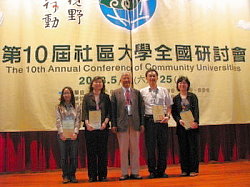Community colleges raise awareness of the importance of lifelong learning

In only a decade, 79 community colleges and 14 tribal community colleges for indigenous peoples have been founded. The goal of community colleges is to provide higher education to everyone, instead of just the chosen few, allowing adults to become better acquainted with themselves, others and modern society, in an attempt to promote higher education for adults and cultivate a newly refined, civil society in Taiwan.
Each year, as many as 220,000 persons study in community colleges, an indication of the demand for lifelong learning and the need for providing more knowledge to the general public. The goal of community colleges for the next ten years should be how to adjust their pace, establish a civil society and provide lifelong learning.
Lifelong learning has become popular thanks to Ministry of Education's support
In the past ten years, the Ministry of Education supported community colleges and provided them with funding, which rose from $64.38 million in 2001 to more than $100 million in and after 2004. The Ministry of Education has so far provided community colleges with more than $1 billion in subsidies, an indication of how much the Ministry values community colleges and lifelong learning.
Minister of Education Cheng Jei-cheng notes the purpose of community colleges is to disseminate knowledge and create a civic society. It is hoped, through civic action learning, people will develop a sense of belonging to the community in which they live and social capital can be accumulated. This type of alternative adult education is very precious. It lays the foundations for building a lifelong learning society and is a force behind social change.
The establishment of community colleges is not only a current trend but also a self-driven force at the grassroots level. Their existence encourages large numbers of community residents to learn about the culture and history of the community, pay attention to public issues such as ecology and environmental protection, and actively take part in different types of volunteer activities.
Community colleges reflect before striding forward
NAPCU Director Gao Ru-ping notes that the word "community" in community colleges refers to more than just communities. Instead, it emphasizes the "public" nature of these colleges. The primary objectives of community colleges are disseminating knowledge and building a civic society.
As far as the "public" nature of community colleges is concerned, the colleges provide a learning environment different from that provided by orthodox schools. Until now, the courses community colleges offer are mostly academic courses as well as those dealing with arts and crafts and community organizations, which have often been considered not "public" enough in nature. In the future, community colleges will enhance their core values, or courses that are "public" in nature, to improve links with the general public.
Apart from their "public" objective, community colleges aim to disseminate knowledge. As passing a rigorous examination and possessing certain abilities are required before being admitted to a college, community colleges endeavor to eliminate such requirements so that those who wish to learn can study anytime they want in order to better themselves.
What will the future development of community colleges be like? How will the Ministry of Education support community colleges? Minister Cheng said that community colleges have been established for ten years. The environment they face is different from what they faced ten years ago. As a result, issues regarding the roles they play and their operation have arisen and must be resolved. For long-term development, they need to retain their original spirit and characteristics, striving to build a civic society, disseminate knowledge and provide an environment for lifelong learning. The Ministry will, as always, continue to support their development so that adults have more opportunities to study and lifelong learning will continue to develop.